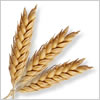
 UK: Unseasonably wet weather causing problems for this year’s wheat, barley harvests
UK: Unseasonably wet weather causing problems for this year’s wheat, barley harvests
The unseasonably wet weather is causing problems for this year’s harvest, experts have said, with wheat, barley and hay crops affected, The Guardian reported on August 7.
Many farmers have been signed up to a nature-friendly scheme called Mid Tier, which does not allow hay to be cut until July to help wildlife.
However, there have been very few dry days since 1 July, leaving farmers insufficient time to cut the grass, spread it out, allow it to dry, row it up and then bale it before it rains again.
Prof Nicola Cannon from the Royal Agricultural University said: “Even if the product is being harvested to be used for animals, it still needs to store well without going mouldy as this not only reduces the quality and desirability of the product but also can make it a fire risk.
“We all know the phrase ‘make hay while the sun shines’, and the reason for this is that, ideally, grass is cut for hay and dries quickly on a warm and breezy day. It is no different to drying your laundry on a washing line – the thicker and the wetter the clothes, and the stiller or duller the weather, the longer it takes for them to dry.”
The wet weather has also affected grain crops, with waterlogged soil making them harder to harvest.
Cannon said: “This time of year is when farmers need to harvest winter wheat, which is used for either animal feed or for making biscuits or bread, but the quality of the grain can be seriously damaged if the ripe wheat crop remains in the field because it is too wet to harvest.
“Grain that remains unharvested in the field in wet weather can start to sprout and is more likely to develop mould, both of which can lead to it being rejected for bread-making, meaning the farmer then receives a lower price.”
She said the wind had also been damaging crops: “In very wet and windy conditions – such as those we have been experiencing lately – the crop may fall over, known as lodging, because the weight of the grain at the top of the plant causes it to lean over. Not only does this make it harder to combine but it also reduces air flow around the grain and impedes drying when the weather is finally dry enough to harvest.”
后退
E-malt.com, the global information source for the brewing and malting industry professionals. The bi-weekly E-malt.com Newsletters feature latest industry news, statistics in graphs and tables, world barley and malt prices, and other relevant information. Click here to get full access to E-malt.com. If you are a Castle Malting client, you can get free access to E-malt.com website and publications. Contact us for more information at marketing@castlemalting.com .





